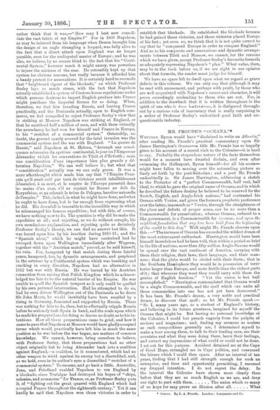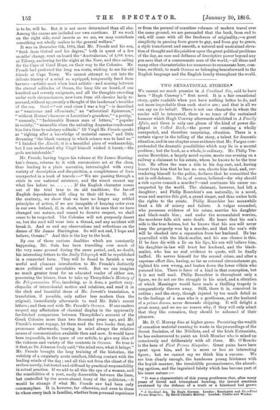MR. FROUDE'S " OCEA.NA." 0 WHETHER Byron would have "disdained to
write an Atlantis," after reading Mr. Froude's practical commentary upon Sir James Harrington's Oceana—a title Mr. Fronde has so happily given to his account of a recent visit to the Colonies—it is hard to say. Probably the stupendous nature of the facts themselves would for a moment have dwarfed disdain, and even after swimming the Hellespont, Byron himself—for all his scorn— might have fallen to musing over the astounding picture so finely set forth by the poet-historian ; and a poet Mr. Fronde undoubtedly is. Sir James Harrington, addressing a sketch to the Protector of a "perfect Commonwealth, half real, half ideal, to which he gave the original name of Oceana, and in which he described the future destiny he believed to be reserved for the Scotch, English, and Anglo-Irish nations," had contrasted his Oceana with Venice, and given the former a prophetic preference over the latter, inasmuch as " Venice, through the straightness of the place and defects of proper arms, can be no more than a Commonwealth for preservation ; whereas Oceana, reduced to a like government, is a Commonwealth for increase, and upon the mightiest foundation. that any has been. laid fi-oni the beginning of the world to this day." Well might Mr. Froude observe upon this :—" The increase of Oceana has exceeded the wildest dream of the most extravagant enthusiast. Harrington would have been himself incredulous had he been told, that within a period so brief in the life of nations, more than fifty million Anglo-Saxons would be spread over the vast continent of America, carrying with them their religion, their laws, their language, and their man- ners; that the globe would be circled with their fleets ; that in the Southern Hemisphere they would be in possession of terri- tories larger than Europe, and more fertile than the richest parts of it ; that wherever they went they would carry with them the genius of English freedom." "Yet the vision is but half accomplished." "Harrington contemplated that Oceana would be a single Commonwealth, and the spell which can unite all these communities into one has not yet been discovered." It has been Mr. Fronde's dream, a very noble and practical dream, to discover that spell ; so let Mr. Froude speak :— " So I, many years ago, as a student of England's history, and believing in its future greatness, imagined for myself the Oceana that might be. But having no personal knowledge of the Colonies, I could but preach vaguely from the pulpits of reviews and magazines ; and, finding my sermons as useless as such compositions generally are, I determined myself to make a tour among them, to talk to their leading men, see their countries and what they were doing there, learn their feelings, and correct my impressions of what could or could not be done. I set out for this purpose. Accident detained me at the Cape of Good Hope, entangled me in Cape politics, and consumed the leisure which T could then spare. After an interval of ten years, finding that I had still strength enough for such an enterprise, and time and opportunity permitting, I resumed my dropped intention. I do not regret the delay. In the interval the Colonies have shown more clearly than before that they are as mach English as we are, and deny our right to part with them The union which so many
of us hope for may prove an illusion after all What
• Cessna. By J. A. Fronde. London : Longman:: and Co.
is to be, will be. But it is not more determined than all else. Among the causes are included our own exertions. If we work on the right side, coral insects as we are, we may contribute something not wholly useless to the general welfare."
It was on December 6th, 1884, that Mr. Froude and his 13011, "fresh from Oxford and his degree," both in quest of a few months' change, went on board the 'Australasian,' of 4,00C tons, at Tilbury, anchoring for the night at the Nore, and then sailing for the Cape of Good Hope, on their way to the Colonies. Mr. Froude had preferred the long sea route, wishing to see his old friends at Cape Town. We cannot attempt to cut into the delicate tracery of a mind so equipped, temporarily freed from harness—artistic most when least artistic—and musing between the eternal solitudes of Ocean, the busy life on board, of one hundred and seventy emigrants, and all the thoughts crowding under such circumstances, new-born from old classics lazily re- perused, without apparently a thought of the landsman's troubles of the sea. 0 rid—" not read since I was a boy"—is described as "wearisome and effeminate," an "atheistical Epicurean," "without Horace's humour or Lucretius's grandeur,"" a pretty," "unmanly," "fashionable Roman man of letters," "popular in society," "miserable when the unfeeling Augustus condemned him for a time to salutary solitude." Of Virgil Mr. Fronde speaks as "sighing after a knowledge of material causes," and little dreaming "the blank vacancy in which science was to land us." "I finished the IEneid ; it is a beautiful piece of workmanship, but I can understand why Virgil himself wished it burnt,—the gods are intolerable."
Mr. Froude, having begun his volume at Sir James Harring- ton's dream, returns to it with unconscious art at the close, thus lending to a plain narrative, intermingled with every variety of description and disquisition, a completeness of form unexpected in a book of travels :—" We are passing through a crisis in our national existence, and the wisest cannot say what lies before us If the English character comes out of the trial true to its old traditions, the far-off English dependencies will cling to their old home. If, on the contrary, we show that we have no longer any settled principles of action, if we are incapable of keeping order even in our own Ireland, if, in short, we let it be seen that we have changed our nature, and ceased to deserve respect, we shall cease to be respected. The Colonies will not purposely desert us, but the cord will wear into a thread, and any accident will break it. And so end my observations and reflections on the dream of Sir James Harrington. So will not end, I hope and believe, Oceana." And this is the key to the book.
By one of those curious dualities which are constantly happening, Mr. Sala has been travelling over much of the very same ground during the same period, and, no doubt, his interesting letters to the Daily Telegraph will be republished in a connected form. They will be found to furnish a very useful and pleasant introduction to Mr. Fronde's distinctly more political and speculative work. But we can imagine no ranch greater treat for an educated reader of either sex, possessing the leisure, than to take up Thncydides's History of the Peloponnesian War, involving, as it does, a perfect ency- clopaedia of intercolonial motive and relations, and read it in the sleek and beautiful dress of Mr. Jowett's translation, a translation, if possible, only rather less modern than the original; immediately afterwards to read Mr. Sala's recent letters ; and then end with Mr. Froude's Oceana. If our readers suspect any affectation of classical display in the apparently far-fetched comparison between Thucydides's account of the Greek Colonies more than two thousand years ago, and Mr. Fronde's recent voyage, let them read the two books first, and pronounce afterwards, bearing in mind always the relative means of communication available then and now. It would have been impossible, in the space of our article, to give any idea of the richness and variety of the contents in Oceana. So true is it that, as Dr. Johnson finely said," the mind sees, what it brings." Mr. Froude brought the long training of the historian, the subtlety of a singularly acute intellect, lifelong contact with the leading minds of the day ; and all this not from the closet of the recluse merely, but tested and stiffened by practical responsibility in actual practice. If we add to all this the eye of a woman, and the sensibilities of a poet, easily discernible between the lines, but controlled by the never-absent irony of the politician,—it would be strange if what Mr. Froude saw had been only commonplace. It is, however, far otherwise, and even to those to whom every inch is familiar, whether from personal experience or from the perusal of countless volumes of modern travel over the same ground, we are persuaded that the book, from end to end, will come with all the freshness of originality,--a great simplicity in passing from grave to gay, and from gay to grave, a style translucent and smooth, a natural and nnstrained eleva- tion of thought and disquisition upon the great political problems of the day, an ease and deftness of descriptive power beyond any pen save that of a consummate man of the world,—all these and many other characteristics too numerous to enumerate here, com- bine, we think, to mark Oceana as belonging henceforward to the English language and the English family throughout the world.



































 Previous page
Previous page